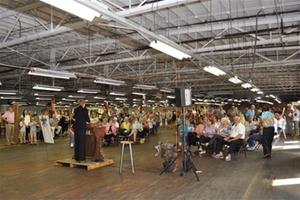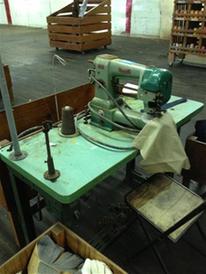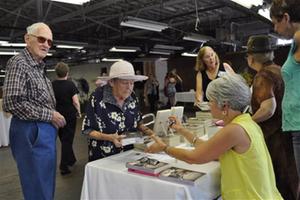 There are book launches... and then there are book launches. The Funeral Dress (Broadway Books), Susan Gregg Gilmore's latest novel, is set during the 1970s (with flashbacks), and two (fictional) Tennessee locations play a key role in the story: the Tennewa Shirt Factory in Cullen and the Fulton-Pittman Funeral Home.
There are book launches... and then there are book launches. The Funeral Dress (Broadway Books), Susan Gregg Gilmore's latest novel, is set during the 1970s (with flashbacks), and two (fictional) Tennessee locations play a key role in the story: the Tennewa Shirt Factory in Cullen and the Fulton-Pittman Funeral Home.
Gilmore's research, however, was based on real workers in a real place, and when planning began for her September 19 book launch at the closed Spartan Industries plant in Dunlap, Tenn., a "small committee of no more than 15 women--the Friends of the Sequatchie County Library--organized the entire event. The chairman, Susan Greer, was unstoppable," she said. Old equipment (sewing machines, pressing machines, collar turners, etc,) and materials (patterns, spools of thread, bundles of collars, buttons, zippers) were found in a neighboring town, brought back to the building and placed as if the factory was still operating. "A 1940s Packard hearse sat in front of the shirt factory, setting the tone," Gilmore recalled. "They all wore black as though they were at a funeral. Floral cemetery sprays flanked either side of the front door. And when I stepped into the factory, I felt as though my novel had unfolded in front of me."
Old equipment (sewing machines, pressing machines, collar turners, etc,) and materials (patterns, spools of thread, bundles of collars, buttons, zippers) were found in a neighboring town, brought back to the building and placed as if the factory was still operating. "A 1940s Packard hearse sat in front of the shirt factory, setting the tone," Gilmore recalled. "They all wore black as though they were at a funeral. Floral cemetery sprays flanked either side of the front door. And when I stepped into the factory, I felt as though my novel had unfolded in front of me."
On the day of the book launch, the building filled with people who had once worked in the factory as pattern setters (always men), managers, pressers, seamstresses, bundle boys, folders. "White-haired women, some in wheelchairs, others using walkers or canes, were there, fingering old patterns, studying the machinery, sharing fond memories," Gilmore said. "One long-time married couple kidded that they had spent too much time in the parking lot making out. Another told me of a woman who walked down Fredonia Mountain to work every day, and one day she stopped and birthed her baby on the side of the road and walked back up the mountain; left the baby with family at home and walked back to the factory to work her shift. She was the one responsible for feeding her family." It was not just about the work, however; it was about making a better life. Gilmore noted that "other women described a community where children came to school barefoot and in the same dirty clothes all week, until the factory opened. Then children came to school in shoes, clean clothes. Before long, grades went up. But I don't think these hard-working women ever expected their work as collar makers, lapel makers, bottom hemmers, sleeve setters and the like to be honored. Yes, it was a celebration of the book and a signing, but it wasn't about me. It was about these amazing women. Nearly 300 men and women came that afternoon, cooling themselves with--you got it--funeral home fans."
It was not just about the work, however; it was about making a better life. Gilmore noted that "other women described a community where children came to school barefoot and in the same dirty clothes all week, until the factory opened. Then children came to school in shoes, clean clothes. Before long, grades went up. But I don't think these hard-working women ever expected their work as collar makers, lapel makers, bottom hemmers, sleeve setters and the like to be honored. Yes, it was a celebration of the book and a signing, but it wasn't about me. It was about these amazing women. Nearly 300 men and women came that afternoon, cooling themselves with--you got it--funeral home fans."
She added her great regret was that Marea Barker, a 29-year veteran lapel maker who "had spent several afternoons talking to me and even showing me around the shirt factory on a cold, gray day nearly two years ago," did not live long enough to attend the celebration. "She never spoke of the tediousness of the task--she only spoke of community."
Singer-songwriter Belinda Smith closed the afternoon event by singing "I Believe in You," a song inspired by The Funeral Dress. "Truth be told, I still get a bit weepy when I think about that day," Gilmore said. --Robert Gray, contributing editor

